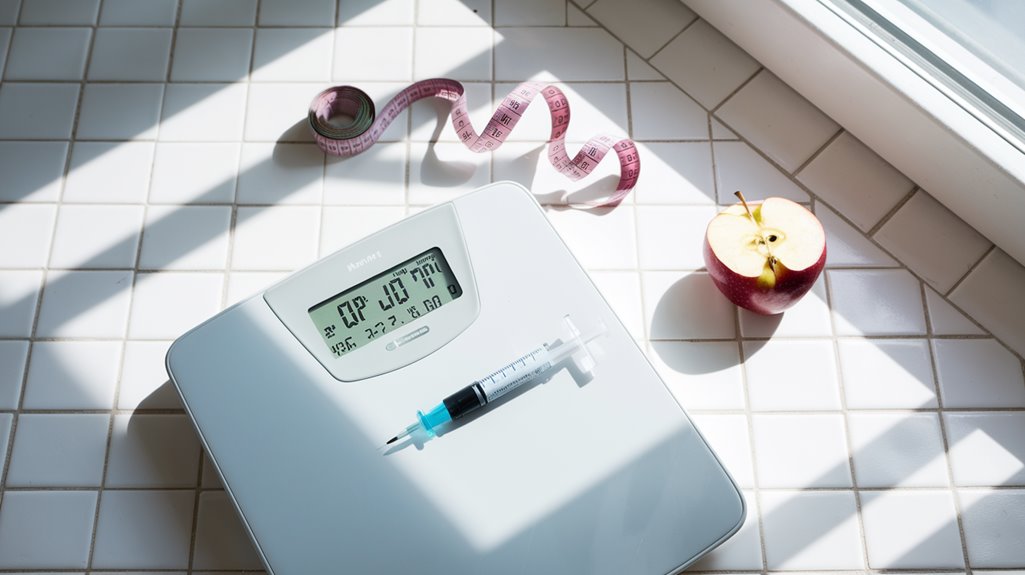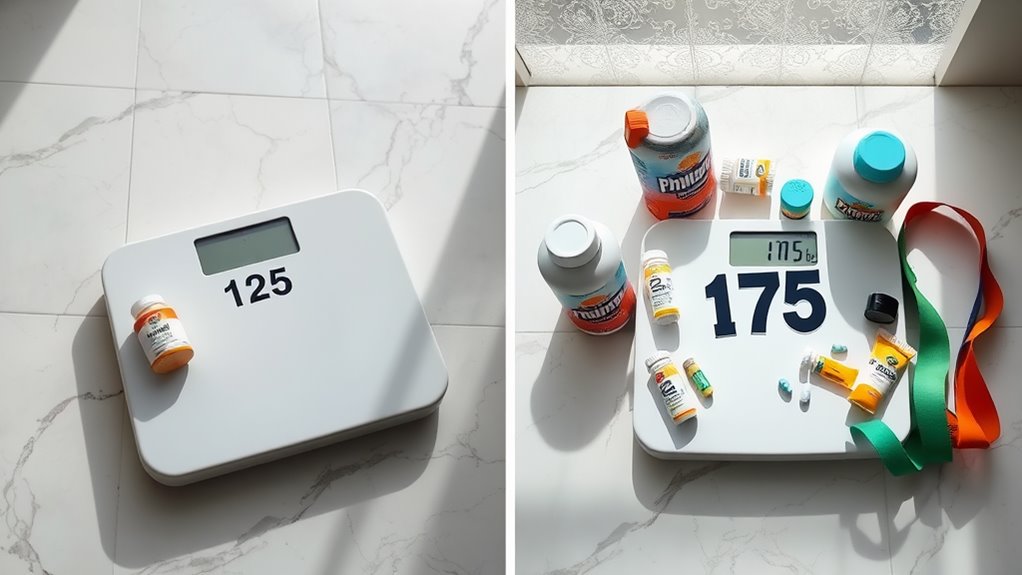Taking Mounjaro for weight loss requires specific medical criteria, but the results for eligible patients can be life-changing.

Mounjaro isn't suitable for all weight loss goals – it's specifically prescribed for adults with obesity (BMI ≥30) or those who are overweight (BMI ≥27) with weight-related health conditions. You'll need a healthcare provider's evaluation to determine if you're eligible for this treatment. Clinical trials show it can help eligible patients lose 12-22% of their body weight over 72 weeks when combined with lifestyle changes. Understanding the specific requirements and mechanisms will help you determine if it's the right option for your situation.
While originally developed as a treatment for Type 2 diabetes, Mounjaro (tirzepatide) functions as a dual GIP and GLP-1 receptor agonist that revolutionizes how the body processes food and regulates blood sugar.
You'll find that Mounjaro works by activating natural receptors in your body that control satiety and insulin sensitivity. It mimics your body's fullness hormones, helping you feel satisfied with smaller portions while improving how effectively your body uses insulin. This mechanism makes it particularly effective for weight management. The medication has demonstrated superior weight reductions compared to traditional weight loss drugs.
In November 2023, the MHRA approved Mounjaro for managing obesity in adults, though it's been used off-label for weight loss before this approval. The medication is administered as a weekly subcutaneous injection using an autoinjector pen. Clinical trials have demonstrated its effectiveness, with participants losing between 12.4% and 15.1% of their body weight over 12 months, making it a significant advancement in obesity treatment.
When starting Mounjaro for weight loss, you'll typically experience modest results in the first month, with weight reduction accelerating as your body adapts to the medication. Initially, you can expect less than 1% weight loss per week, with some of this being water weight as your body depletes glycogen stores. Managing side effects like nausea becomes essential during the first few weeks of treatment.
Long-term outcomes are more significant, with clinical trials showing impressive results after 72 weeks of use. You'll likely achieve 16% weight loss on a 5mg dose, while higher doses of 10mg and 15mg can lead to losses of 21.4% and 22.5%, respectively. To maximize these results, you'll need to maintain a daily caloric deficit of about 600 calories and incorporate regular exercise.
Remember that Mounjaro isn't a standalone solution. You'll need to combine it with lifestyle changes, including a balanced diet rich in fruits, vegetables, lean proteins, and whole grains. Regular consultations with your healthcare provider will help monitor your progress and adjust your treatment plan accordingly.
Understanding who can benefit from Mounjaro helps determine if it's the right choice for your weight management journey. You may be a candidate if you're an adult with a BMI of 30 or higher, or if your BMI is 27 or higher with at least one weight-related condition like type 2 diabetes, high blood pressure, or high cholesterol.
You should consider Mounjaro if you've struggled to achieve meaningful weight loss through other methods, especially if you also have metabolic syndrome or type 2 diabetes. The medication can address both weight management and blood sugar control simultaneously as part of a thorough treatment approach. The medication begins with a 2.5 mg weekly dose and may be adjusted based on your response.
However, you won't qualify for Mounjaro if you're under 18, have type 1 diabetes, or have pancreatitis. The medication isn't recommended during pregnancy or breastfeeding. Consult your healthcare provider to evaluate your eligibility and determine if Mounjaro aligns with your specific health needs and weight loss goals.
Mounjaro's unique dual-action mechanism targets both GLP-1 and GIP receptors, setting it apart from single-receptor medications like Ozempic and Wegovy. When you take Mounjaro, these activated receptors work together to reduce your appetite, slow digestion, and improve your body's insulin sensitivity. Clinical trials support this dual-receptor approach, with participants losing up to 21% of their body weight and achieving superior results compared to single-receptor alternatives. The medication's ability to enhance metabolic functions leads to consistent and sustainable weight management outcomes.
The groundbreaking dual-receptor activation mechanism of Mounjaro sets it apart from traditional diabetes medications by simultaneously targeting both GLP-1 and GIP receptors. This unique approach enhances your body's insulin secretion while reducing glucagon levels in a glucose-dependent manner.
You'll experience more extensive metabolic benefits compared to single-receptor medications. The dual activation leads to superior A1C reductions and significant weight loss – up to 25 pounds with the 15mg dose. The SURMOUNT-2 trial results demonstrated an impressive 15.7% reduction in body weight for participants. Clinical trials have demonstrated that Mounjaro's mechanism contributes to improved cardiovascular outcomes and a reduced risk of hypoglycemia.
With six available doses ranging from 2.5mg to 15mg, you'll benefit from a flexible treatment approach that can be personalized to your specific needs, making it an effective option for both diabetes management and weight loss goals.
While traditional weight loss medications often target single pathways, Mounjaro's sophisticated dual-action mechanism delivers enhanced metabolic benefits through simultaneous GIP and GLP-1 receptor activation. When you take Mounjaro as a weekly injection, it strategically influences your body's appetite control centers and metabolic processes. The treatment works best when combined with exercise and other lifestyle modifications to maximize weight loss outcomes.
The medication works by slowing gastric emptying, increasing feelings of fullness, and reducing hunger signals in your brain. You'll experience improved insulin sensitivity as Mounjaro enhances your pancreas's insulin production while reducing liver glucose output. This dual approach helps your body maintain steady blood sugar levels and utilize stored fat more efficiently.
Clinical evidence demonstrates Mounjaro's effectiveness, with patients losing 12.4% to 15.1% of their body weight over 12 months when combined with lifestyle modifications.
Landmark clinical trials have demonstrated Mounjaro's exceptional effectiveness for weight management, with patients achieving up to 21% body weight reduction over 72 weeks in the SURMOUNT-1 trial. The evidence shows you're twice as likely to achieve 10% weight loss and three times more likely to reach 15% weight loss compared to Ozempic.
Clinical data from five global trials involving 6,263 adults confirms these results. At the 15 mg dose, you can expect approximately 15.7% body weight loss over 18 months, while the 10 mg dose yields 13.4% reduction. Significantly, 80% of participants lost at least 5% of their body weight on Mounjaro, compared to just 30% on placebo. These outcomes are consistent across both diabetic and non-diabetic populations. The latest SURMOUNT-2 trial specifically showed impressive results in patients with Type 2 diabetes.

When you're evaluating weight loss medications, Mounjaro stands out with its impressive 47% greater relative weight loss compared to Wegovy over 72 weeks. Its dual-action mechanism, targeting both GLP-1 and GIP receptors, explains why patients are 2-3 times more likely to achieve significant weight losses of 10%-15% compared to single-receptor medications. Clinical trials demonstrate that Mounjaro users experience average weight losses of 12.4% to 15.1% over 12 months, with some patients on the highest dose achieving up to 21% body weight reduction. The medication was initially indicated for diabetes before expanding into weight management treatments in September.
Recent clinical trials and real-world analyses have demonstrated Mounjaro's superior effectiveness compared to other leading weight loss medications. You'll find that Mounjaro outperforms both Wegovy and Ozempic, with studies showing a 47% greater relative weight loss compared to Wegovy over 72 weeks. Specifically, Mounjaro users lost an average of 20.2% of their body weight, while Wegovy users lost 13.7%.
When compared to Ozempic, Mounjaro shows equally impressive results. You can expect about 15.3% weight loss with Mounjaro versus 8.3% with Ozempic after 12 months. A comprehensive study analyzing 41,222 adults supports these findings. The SURPASS-2 study confirms these findings, with 81.8% of Mounjaro users losing at least 5% of their weight within a year, compared to 66.5% for Ozempic users.
Three distinct treatment approaches characterize Mounjaro's weight loss protocol, setting it apart from traditional options. First, you'll receive a precisely calibrated weekly self-injection starting at 2.5 mg, which can be adjusted based on your response. Second, you'll combine the medication with a structured diet and exercise program to maximize results. Third, you'll undergo regular monitoring for potential thyroid issues and other health markers. The convenient design of the KwikPen device makes administration simple for most patients.
Clinical trials demonstrate Mounjaro's effectiveness, with participants achieving 15-20% weight loss over 72 weeks. When using the highest maintenance dose, you can expect an average 22% reduction in body weight. The medication's dual GIP/GLP-1 mechanism helps control hunger while increasing satiety, making it easier to maintain your prescribed dietary changes and exercise routine.
Before starting Mounjaro for weight loss, patients must understand several critical safety considerations and risk factors that could impact their treatment journey. You shouldn't take Mounjaro if you have a personal or family history of medullary thyroid carcinoma, Multiple Endocrine Neoplasia syndrome type 2, or severe allergic reactions to tirzepatide. Proper storage is essential, as the medication must be kept refrigerated between 36°F to 46°F.
You'll need careful monitoring for serious side effects, including pancreatitis, which presents as severe abdominal pain radiating to your back. Watch for signs of thyroid tumors, such as neck swelling, hoarseness, or difficulty swallowing. If you're taking other diabetes medications, you're at increased risk of hypoglycemia.
Common side effects include gastrointestinal issues like nausea, vomiting, and diarrhea. These symptoms can lead to dehydration and potential kidney problems. It's crucial to use Mounjaro under medical supervision, and you'll need immediate medical attention if you experience severe side effects.

Making significant lifestyle changes alongside Mounjaro therapy is essential for achieving your weight loss goals, with exercise and dietary modifications serving as cornerstones of success. You'll need to commit to at least 150 minutes of moderate aerobic activity weekly, incorporate strength training, and adopt a diet rich in whole foods while limiting processed options. Regular tracking of your food intake, physical activity, and weight measurements will help you monitor progress and make necessary adjustments to your program. Working with a registered dietitian can provide you with personalized meal planning and nutrition guidance to optimize your weight loss journey.
While Mounjaro offers promising results for weight management, its effectiveness depends greatly on implementing necessary lifestyle modifications. You'll need to maintain a balanced diet with a daily caloric deficit of 500 calories and prioritize protein-rich foods while reducing processed foods and added sugars. Studies indicate you can achieve 15-20.9% weight loss when following the recommended protocol for 18 months. It's vital to engage in at least 150 minutes of moderate-intensity physical activity weekly, combining both cardio and strength training exercises.
You'll also need to focus on proper hydration, stress management, and quality sleep to optimize your results. Regular consultations with healthcare professionals will help monitor your progress and adjust your personalized plan as needed. Remember that individual responses to Mounjaro vary, making it essential to commit to these extensive lifestyle changes for long-term success.
Successful weight management with Mounjaro requires consistent tracking of your progress through multiple methods. You'll need to conduct weekly weigh-ins at the same time each day, preferably in the morning, while also monitoring non-scale victories like improved energy and sleep quality. Focus on mindful eating habits to better recognize your body's natural hunger and fullness signals throughout your journey. To optimize your results, you should maintain detailed food and exercise logs while documenting your emotional patterns through journaling. Studies show participants typically lose 12.4% to 15.1% of their body weight over 12 months on Mounjaro when combined with lifestyle changes. You'll need to identify and address potential obstacles, such as underlying medical conditions, medication interactions, or stress levels. Regular check-ins with healthcare providers, along with support from dietitians and personal trainers, can help guarantee you're staying on track toward your weight loss goals.
To achieve meaningful weight loss with Mounjaro, establishing realistic targets is essential for long-term success. You'll want to aim for a steady weight loss rate of 1-2 pounds per week, which translates to 4-8 pounds monthly. This gradual approach helps create sustainable results while minimizing the risk of rebound weight gain.
When setting your goals, focus on specific, measurable behaviors rather than just outcome-based targets. Instead of solely focusing on "losing 30 pounds," include actionable objectives like "exercise for 30 minutes three times weekly" or "prepare healthy meals at home five days a week." These behavior-focused goals provide clear direction and measurable progress markers. Consider working with a professional weight loss program to develop a customized plan that aligns with your specific needs.
Remember that Mounjaro works best when combined with lifestyle modifications. Your weight loss journey should integrate healthy eating habits, regular physical activity, and stress management techniques. This thorough approach, along with the medication's appetite-suppressing effects, will help you reach your targets more effectively.

Regular monitoring of your progress on Mounjaro involves tracking multiple health metrics beyond the number on your scale. You'll need to weigh yourself consistently once weekly under the same conditions while also measuring your body composition every few weeks to track fat loss accurately. Many patients achieve optimal results with doses of 5-10mg weekly once they complete their initial titration period.
| Metric | Frequency | Purpose |
|---|---|---|
| Weight | Weekly | Track overall progress |
| Body Measurements | Bi-weekly | Monitor fat distribution |
| Blood Work | Quarterly | Assess metabolic health |
Your healthcare provider will adjust your Mounjaro dosage gradually, starting at 2.5mg and increasing in 2.5mg increments every four weeks until reaching your maintenance dose. During this process, you'll need to track any side effects and communicate regularly with your doctor. Using digital health tools to log your food intake, physical activity, and medication adherence will help provide a thorough view of your treatment's effectiveness. Remember to maintain consistent injection timing and stay well-hydrated to optimize your results.
While tracking your progress on Mounjaro provides valuable short-term insights, long-term weight management demands an all-encompassing lifestyle approach. You'll need to establish sustainable habits that extend beyond medication, including a balanced diet with a 600-calorie daily deficit and regular physical activity of at least 150 minutes per week.
Focus on incorporating fiber-rich foods and healthy fats while minimizing processed foods and alcohol consumption. Your success depends on setting realistic, specific goals and developing stress management techniques. Don't underestimate the importance of quality sleep – aim for 8 hours nightly in a dark room with electronics turned off. Consider eating your meals at the dining table only to maintain better control over portions.
Build a support network of healthcare professionals, family, and community resources. Remember that setbacks are normal, but having strategies to overcome them is essential. Rather than pursuing an ideal weight, prioritize your overall health through consistent, sustainable practices that you can maintain indefinitely.

Understanding the financial aspects of Mounjaro treatment is essential for long-term planning. The retail cost ranges from $1,000-$1,200 monthly without insurance, but several options exist to make it more affordable. The lack of generic alternatives until 2036 keeps prices high.
| Cost Factor | Details |
|---|---|
| Retail Price | $1,069.08/month |
| With Insurance (T2D) | As low as $25/month |
| Savings Card Max | $1,800/year |
| Net Price Estimate | ~$215/month |
| Off-Label Coverage | Limited insurance support |
If you're using Mounjaro for type 2 diabetes, your commercial insurance will likely provide coverage, potentially reducing your cost to $25 per prescription. However, off-label use for weight loss faces more insurance challenges. You'll need to explore Eli Lilly's patient assistance programs, which can save up to $573 monthly. The prior authorization process might require detailed documentation from your healthcare provider to demonstrate medical necessity, especially for weight loss purposes.
While Mounjaro's path to weight loss resembles a well-engineered GPS system for your metabolism, it's not a universal solution for every weight loss journey. You'll need to weigh its proven effectiveness against your specific health profile, weight loss goals, and financial considerations. Through careful medical supervision and commitment to lifestyle changes, you can determine if Mounjaro aligns with your weight management roadmap.